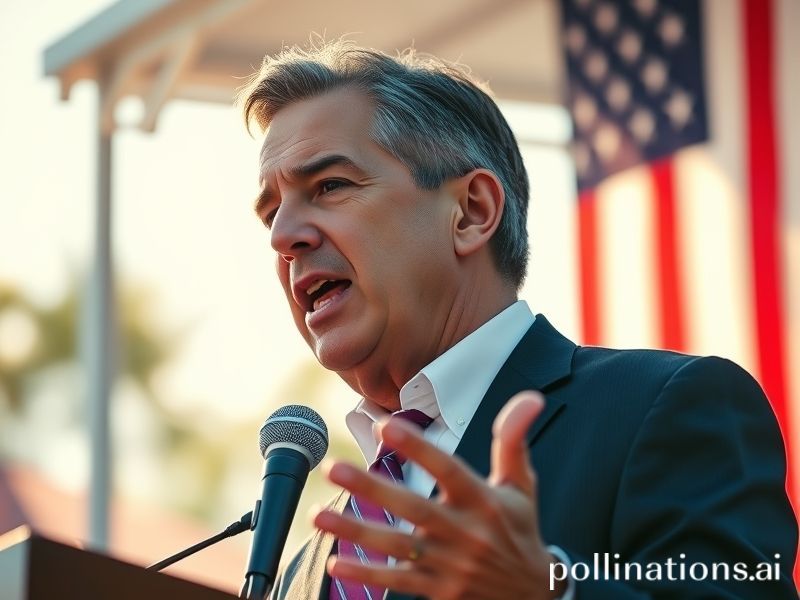Jack Ciattarelli: How a New Jersey Tax Rebel Became the World’s Favorite Political Sideshow
Jack Ciattarelli: A Garden-Variety Governor Who Never Was, Viewed from the Cheap Seats of the World
By Our Correspondent Somewhere Over the Atlantic
PARIS—Somewhere between the espresso bar at Charles de Gaulle and the duty-free shop selling cigarettes named after emotions, one might pause to ask: why, in a year when the Arctic caught fire and crypto-bros reinvented feudalism, does the name Jack Ciattarelli still flutter across international headlines like a lost moth? The short answer is that the American talent for turning provincial tax attorneys into global Rorschach tests remains undefeated. The long answer involves taxes, Trump, and the persistent fantasy that New Jersey—a state whose major cultural export is still The Sopranos—can serve as a geopolitical weather vane.
Ciattarelli, for the blessedly uninitiated, was the Republican who nearly toppled incumbent Governor Phil Murphy in 2021. “Nearly” here means a margin of roughly three percent, or, in New Jersey terms, the number of people who claim they “summer” in Belmar. The race should have ended there, another colorful footnote in America’s ongoing game of democratic Jenga. Yet because the United States insists on exporting its political telenovelas in HD, the world keeps receiving reruns. From Berlin cafés where policy wonks parse American gubernatorial races like kabbalistic texts, to Seoul business districts where hedge funds bet on municipal bond yields in Hackensack, Ciattarelli became an unlikely leading indicator: Could the post-Trump GOP still win in a state that’s basically New York’s sarcastic little brother?
Globally, the stakes looked absurdly small but were magnified by the fun-house mirror of U.S. influence. When Ciattarelli vowed to roll back vaccine mandates, French newspapers ran explainers titled “Le Micro-Macron du New Jersey,” equating him with the Gallic anti-pass-sanitaire crowd. Tokyo analysts, meanwhile, quietly moved their yen into pharmaceutical shorts, assuming any American setback in public health would ripple through supply chains faster than you can say “iPhone made in Shenzhen.” And in Lagos, where WhatsApp University already teaches that 5G causes crabgrass, Ciattarelli’s skepticism was clipped into thirty-second voice notes and forwarded to 400 million phones before the election was even called.
The man himself is no firebrand demagogue; he has the demeanor of an accountant who once read a Reagan biography and thought, “Nice, but could use more spreadsheets.” Which, in 2023’s carnival of global populism, made him oddly exotic. While Italy elected a post-fascist influencer and Argentina flirted with an anarcho-capitalist cosplaying as a tantric guru, Ciattarelli’s promise was simply to lower property taxes and maybe not yell so much. In the international press, this registered as quaint—like a Swiss bank deciding to open on Saturdays out of sheer politeness.
Of course, the joke is on all of us. Because whether Jack Ciattarelli ever occupies Drumthwacket (yes, that’s the governor’s mansion, named like a minor Tolkien villain) matters less than the narrative freight we keep loading onto America’s sub-national pageants. Every Delhi think tank now hosts a “What If Jersey Flips?” seminar, complete with paneer pizza and PowerPoint slides about suburban moms’ voting patterns. Every London bookmaker slaps odds on a 2025 rematch as if it were the World Cup of zoning disputes. The planet has become a stadium where the halftime show is U.S. off-year elections, and we’re all stuck holding foam fingers emblazoned with county-level vote tallies.
What does it say about our collective attention span that a man whose signature policy is a marginal tax reduction on boat trailers commands trans-Atlantic think pieces? Perhaps that in an era when actual empires rise and fall on TikTok, the minor tremors of American suburbia feel comfortingly legible. Or maybe it’s simpler: the world is addicted to watching the United States argue with itself, because it beats staring at our own domestic horrors. At least New Jersey’s traffic circles have an exit strategy.
Ciattarelli will likely run again, and lose again, or win and discover that governing a state whose official pastime is road rage is less romantic than it sounds. Either way, the international commentariat will tune in, nod wisely, and file another dispatch about “the soul of moderate Republicanism,” while the actual souls in question are just trying to find cheaper car insurance.
Until then, somewhere above the clouds, the lost moth keeps flapping—carrying on its wings the improbable hope that somewhere in America’s strip-mall hinterlands, the next great geopolitical hinge is hiding between a vape shop and a bagel joint. And we, the weary spectators of Earth, will keep watching, because it’s either that or look at the melting ice caps again.







